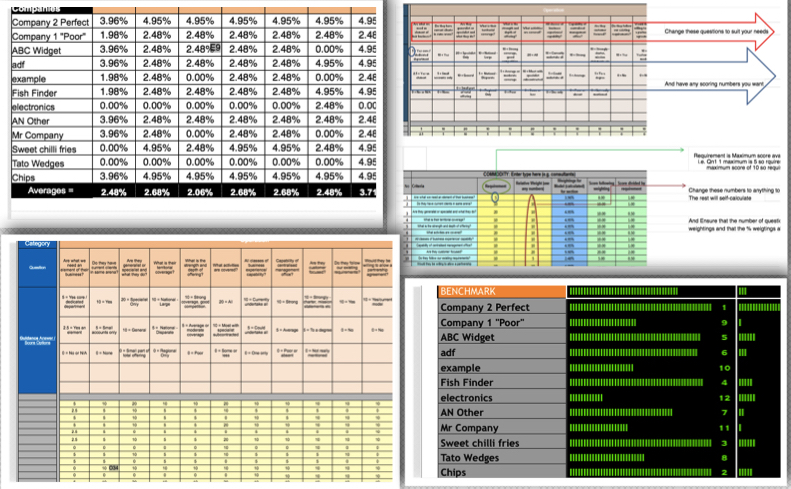The Ultimate Guide to Company Comparison Tools: How to Make Informed Decisions
In the fast-paced world of business, making informed decisions is crucial. Whether you’re an investor looking to assess stocks, a potential employee comparing employers, or a business owner evaluating competitors, a company comparison tool is invaluable. These tools help users make more data-driven, transparent decisions by offering detailed insights into various companies’ performance, financial health, and overall standing in the market. This article will explore the importance of company comparison tools, how to use them effectively, and the best practices to follow.

What is a Company Comparison Tool?
A company comparison tool is an online platform or software designed to provide side-by-side comparisons of different companies. These tools typically analyze and display key metrics such as:
-
Revenue
-
Profit margins
-
Stock performance
-
Customer satisfaction
-
Employee engagement
-
Market share
Such comparisons allow users to evaluate businesses objectively based on factual data rather than subjective opinions. Whether you are comparing similar companies within the same industry or contrasting completely different ones, these tools help simplify the decision-making process.
Why Do You Need a Company Comparison Tool?
Using a company comparison tool offers several advantages for users across different fields. Here are some key reasons why these tools are beneficial:
1. Informed Decision-Making
Comparing companies based on accurate data allows for better decision-making. For investors, it means evaluating which stocks or companies are likely to yield the best returns. For potential employees, it helps in understanding the work culture, benefits, and stability of a company.
2. Saving Time and Effort
Rather than scouring multiple reports and websites for information, a company comparison tool consolidates all the data into one place. This significantly reduces research time and allows you to quickly grasp the critical metrics of different companies.
3. Objective Analysis
A comparison tool provides an unbiased, data-driven approach to evaluating companies. This ensures that your analysis is based on real facts and figures, not hearsay or assumptions.
Key Features of a Company Comparison Tool
When choosing a company comparison tool, it’s essential to understand what features to look for. Below are some of the most useful features these tools offer:
1. Side-by-Side Comparison
The most basic and essential feature of any comparison tool is the ability to view multiple companies’ key metrics side by side. This allows you to spot trends, compare performance, and make better choices.
For example, if you’re comparing two potential employers, you can assess their employee satisfaction, growth opportunities, and compensation packages in one glance.
2. Customizable Filters
A good comparison tool should allow you to filter the data according to your preferences. You may want to compare companies based on financial performance, market presence, or other specific factors. Custom filters can help you narrow down the results to the most relevant companies for your needs.
3. Historical Data
Understanding how a company has performed over time is crucial. Look for comparison tools that offer historical data and trends. This feature is particularly helpful for investors evaluating stocks or business owners comparing their performance to competitors.
4. Industry Benchmarks
Some comparison tools also provide industry benchmarks to help you understand how a particular company stacks up against industry standards. This is valuable when comparing companies within the same market segment.
How to Use a Company Comparison Tool Effectively
Using a company comparison tool effectively involves more than just inputting company names and reviewing the results. Here are some tips on how to maximize its utility:
1. Define Your Goals
Before using the tool, it’s crucial to define what you’re looking for. Are you comparing companies to decide which stock to invest in? Or are you trying to evaluate potential employers? Your goals will guide how you interpret the data.
2. Consider Multiple Metrics
Don’t focus solely on one or two metrics. A successful comparison involves evaluating several different factors. For instance, if you’re an investor, look at revenue, market share, growth rates, and profitability, rather than just stock prices.
3. Look Beyond the Numbers
While data is essential, it’s also important to consider qualitative factors. For instance, customer reviews, employee satisfaction, and social responsibility are metrics that numbers alone can’t fully capture but play a significant role in a company’s reputation.

4. Stay Updated
Markets and businesses evolve over time, so it’s important to use up-to-date comparison tools. Choose a tool that is regularly updated with the latest data, trends, and analysis.
Best Company Comparison Tools on the Market
Several company comparison tools are available online. Here are some of the top-rated platforms:
1. Morningstar
Morningstar is a renowned financial analysis tool that offers comprehensive data on stocks, mutual funds, and ETFs. It allows investors to compare multiple companies based on financial performance and risk metrics.
2. MarketBeat
MarketBeat provides data-driven insights for investors. The platform allows users to compare stocks, track market trends, and evaluate company performance in real-time.
3. Owler
Owler is a popular business comparison tool that provides in-depth company profiles, competitor analysis, and industry insights. It is especially useful for business owners or entrepreneurs looking to benchmark their companies against competitors.
4. G2
G2 is a popular tool for comparing software companies. It aggregates reviews and ratings from real users, helping businesses choose the best software solutions for their needs.
5. CompanyCheck
CompanyCheck is a business comparison tool primarily used in the UK, offering detailed financial data, credit ratings, and legal information about companies. It’s perfect for business owners looking to assess competitors or potential partners.
How a Company Comparison Tool Helps Businesses
If you’re a business owner, using a company comparison tool can significantly improve your strategic planning. Here’s how:
-
Competitor Analysis: By comparing your business to competitors, you can identify areas for improvement and innovation.
-
Market Positioning: Understanding where your company stands in relation to others in your industry helps with positioning your brand more effectively.
-
Pricing Strategy: Comparing pricing models across businesses can help you determine whether your pricing strategy is competitive.
FAQs About Company Comparison Tools
1. Can I compare companies across different industries?
Yes, many company comparison tools allow you to compare companies from different industries, although the metrics might differ. Make sure to use industry-specific filters to get the most relevant data.
2. Are company comparison tools free to use?
Some comparison tools offer free access to basic features, while others require a subscription for more advanced insights. Many platforms offer free trials so you can explore the features before committing.
3. How accurate is the data on these tools?
Most reputable company comparison tools provide accurate and regularly updated data sourced from reliable financial reports, public filings, and other trusted databases.
4. Can I use a comparison tool for employee evaluations?
Yes, several comparison tools, like Glassdoor, allow you to compare companies based on employee satisfaction, compensation, and benefits.
Conclusion
A company comparison tool is an essential resource for anyone looking to make well-informed business decisions. Whether you’re an investor analyzing stocks, a business owner assessing competitors, or an employee evaluating job opportunities, these tools provide valuable insights that go beyond basic metrics. By utilizing the best features of these platforms, you can ensure that your decisions are data-driven and based on the most accurate, up-to-date information available.

For more detailed guides and to access top-notch comparison tools, be sure to check out our resources.



